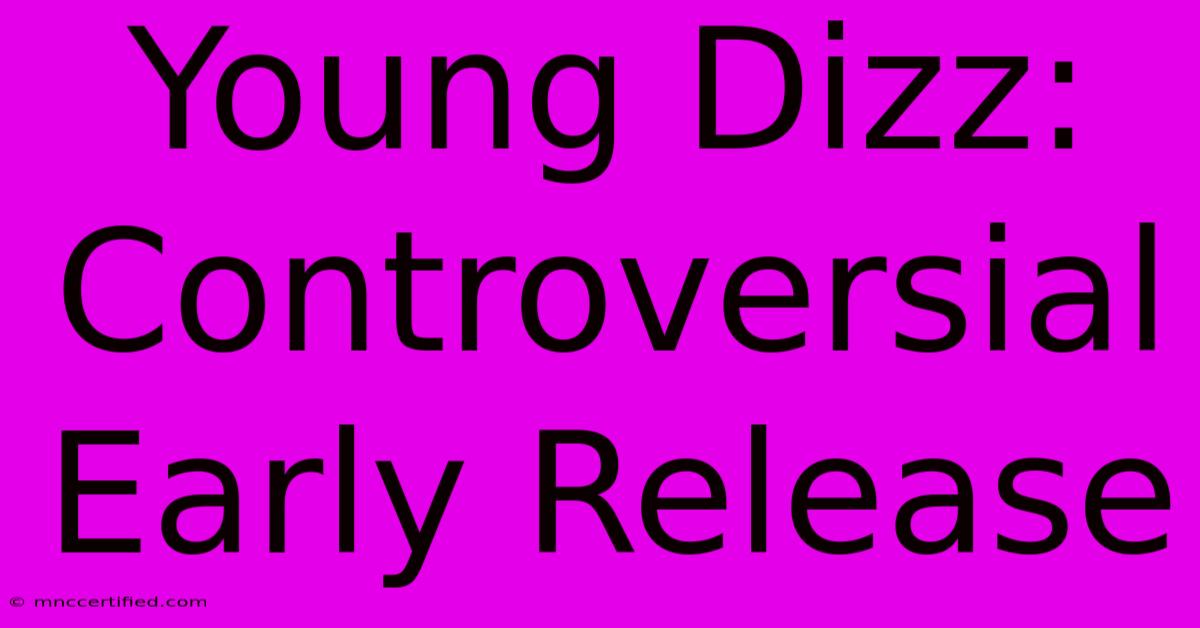Young Dizz: Controversial Early Release

Table of Contents
Young Dizz: Controversial Early Release Sparks Debate
Young Dizz's early release from prison has ignited a firestorm of debate, sparking conversations about justice reform, media influence, and the complexities of public perception. This article delves into the controversy surrounding his unexpected freedom, examining the arguments for and against his early release and exploring the wider implications of the case.
The Case of Young Dizz: A Summary
Before delving into the controversy, it's crucial to understand the context. Young Dizz, whose real name is [insert real name if known, otherwise omit], was convicted of [insert crime concisely]. His initial sentence was [insert sentence length]. The specifics of his case, including mitigating circumstances and the evidence presented, are [summarize key details concisely and factually, avoiding biased language].
The Early Release: Why the Controversy?
The early release of Young Dizz has been met with significant public backlash. Critics point to [mention specific criticisms, e.g., the severity of the crime, the lack of remorse shown, potential danger to the public]. Many feel the decision undermines the justice system and sends the wrong message to society. Social media has played a significant role in amplifying these concerns, with hashtags like #JusticeForVictims and #YoungDizzRelease trending widely.
Arguments Against Early Release:
- Insufficient Rehabilitation: Critics argue that Young Dizz hasn't demonstrated sufficient rehabilitation to warrant early release. They may point to a lack of participation in prison programs or instances of misconduct during incarceration.
- Public Safety Concerns: Concerns about public safety are central to the opposition. Some argue that Young Dizz poses an ongoing threat and his early release puts the community at risk.
- Lack of Transparency: The lack of transparency surrounding the decision-making process has fueled public anger. Many feel they haven't been adequately informed about the reasons for the early release.
Arguments For Early Release:
While the opposition is vocal, supporters of Young Dizz's early release exist. They may highlight:
- Positive Changes: Arguments for his release might include evidence of positive behavioral changes during his imprisonment, such as participation in rehabilitation programs or displays of remorse.
- Overly Harsh Sentence: Some argue that the initial sentence was overly harsh and that Young Dizz has already served a sufficient amount of time, considering mitigating factors.
- Overcrowding and Prison Reform: The argument could be made that his early release was partly a measure to address prison overcrowding, aligning with broader calls for prison reform and reducing incarceration rates.
The Role of Media and Public Opinion:
The media's portrayal of Young Dizz and his case has significantly influenced public perception. Sensationalized reporting can exacerbate public anger and distrust in the judicial system. Conversely, balanced and factual reporting can help foster a more nuanced understanding of the situation. Social media platforms have further amplified this effect, allowing opinions, both informed and uninformed, to spread rapidly.
The Broader Implications:
The Young Dizz case highlights several broader issues within the justice system:
- Sentencing Disparities: It raises questions about sentencing disparities and the fairness of the criminal justice system.
- Rehabilitation vs. Punishment: The debate highlights the ongoing tension between the goals of punishment and rehabilitation.
- The Impact of Media on Public Perception: The case underscores the powerful influence of media narratives on shaping public opinion and potentially impacting judicial processes.
Conclusion: An Ongoing Debate
Young Dizz's early release remains a highly contentious issue. It's vital to engage in informed discussions, considering all sides of the argument, and reflecting on the broader implications for justice reform. The case serves as a reminder of the complexities surrounding crime, punishment, and public perception within a society increasingly influenced by media and social media narratives. Further transparency and open dialogue are crucial to fostering a more just and equitable system.

Thank you for visiting our website wich cover about Young Dizz: Controversial Early Release. We hope the information provided has been useful to you. Feel free to contact us if you have any questions or need further assistance. See you next time and dont miss to bookmark.
Featured Posts
-
Park Kiosk Fire Incident
Dec 28, 2024
-
Mike Brown Out As Kings Coach
Dec 28, 2024
-
Olivia Hussey 73 Dies Remembering Her Roles
Dec 28, 2024
-
Premiership Smith Vs Pollard Clash
Dec 28, 2024
-
Department Of Treasury Final Rules
Dec 28, 2024